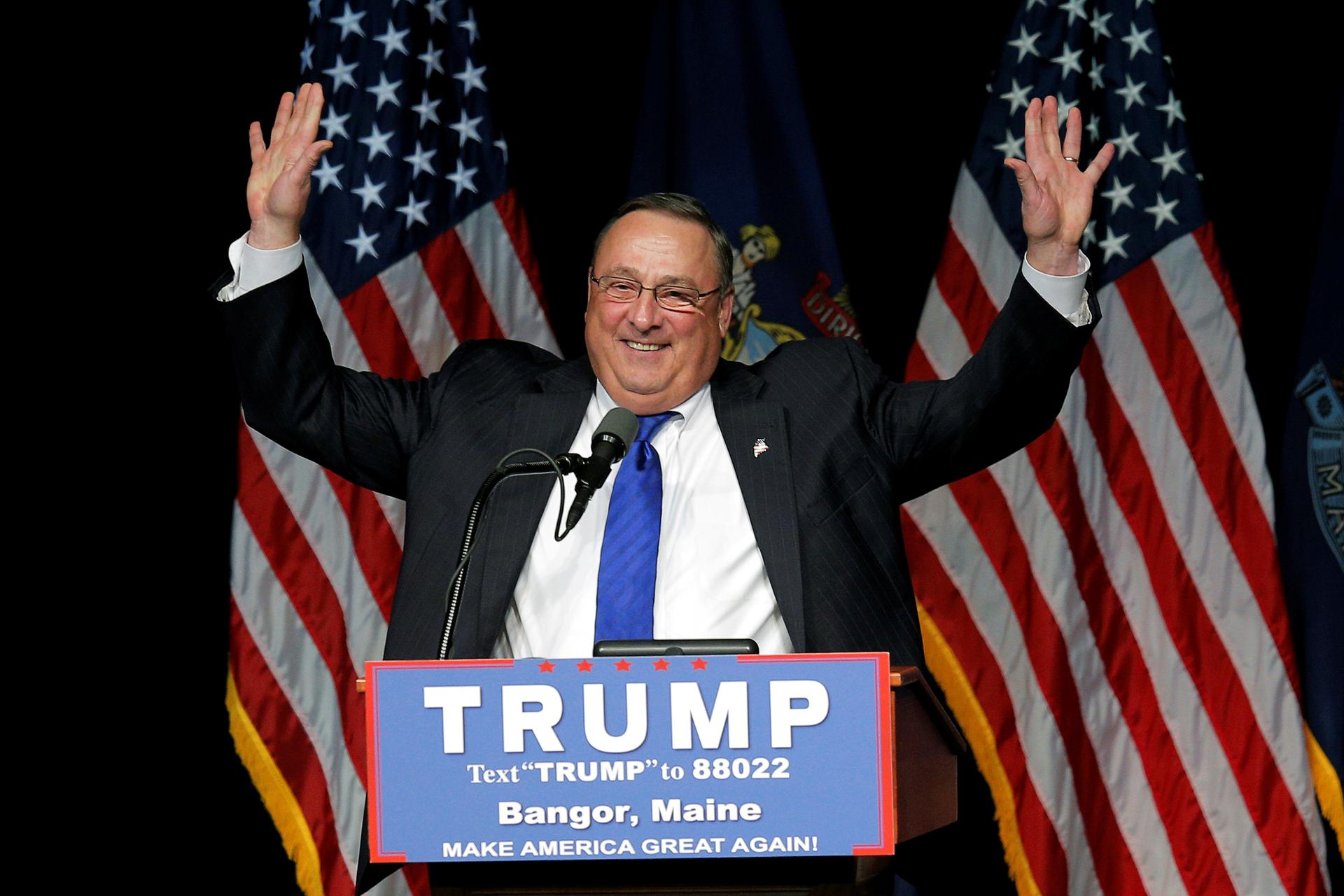Maine governor, a Trump supporter, draws flack for his racist rhetoric
Maine Governor Paul LePage introduces US Republican presidential candidate Donald Trump at a campaign rally in Bangor, Maine, June 29, 2016.
This campaign season, Republican presidential nominee Donald Trump has been a lightning rod for controversial and offensive statements that have dumbfounded journalists, voters, and politicians, including those from his own party.
But Trump isn’t the only politician making outlandish comments. Maine Governor Paul LePage, one of the first governors to endorse Trump for president, is in the news for what many view as increasingly racist and bigoted comments about minorities. Here’s what he said on Friday while discussing the state’s drug crisis:
“When you go to war, if you know the enemy — the enemy dresses in red and you dress in blue — you shoot at red. … You shoot at the enemy. You try to identify the enemy, and the enemy right now — the overwhelming majority of people coming in — are people of color or people of Hispanic origin.”
Following that statement, LePage left a profanity-laced voicemail for state Representative Drew Gattine, who he was mistakenly told called him a racist. Later, LePage told reporters that he would like to challenge Gattine to duel and shoot him right between his eyes.
On Tuesday, The Portland Press Herald reported that the governor may resign over his comments, which have caused a stir in The Pine Tree State and nationally. What does the 2016 election cycle hold for LePage and his state? Cynthia Dill, a lawyer, columnist, and former Democratic state senator from Maine, has a few ideas.
“I think Governor LePage is going to do a lot to move the needle in the election, both at the presidential level as well as with local races,” she says. “In Maine, our entire legislature, like in many states, turns over every two years, so I think people will be running primarily whether they’re with LePage or against him, similar to the referendum on Trump.”
Though LePage, a Republican, has been elected twice, the state of Maine has voted Democratic in every presidential election since 1992. Though LePage won’t be on the ballot, Dill argues that the governor’s comments may create an uphill battle for GOP lawmakers who are seeking re-election in November.
“I don’t think he’s popular,” she says. “In addition to him being a racist and a homophobe and threatening to shoot people, he also has a record of vetoes and vetoes every piece of legislation that might move the state forward. People who are running for the state legislature have to be clear with their constituents whether they’re going to be a supporter of LePage or going to work with the group of Republicans who are trying to collaborate with Democrats to address some of our problems here.”
Year-over-year, drug overdoses are up 40 percent in Maine, most of which are linked to the heroin epidemic that continues to rock parts of the nation. Additionally, Dill says about 20 percent of children in Maine currently live in poverty, and the job market remains rocky.
“There are serious issues that Maine people want the government to address, and unfortunately, there’s a huge distraction every week by our governor,” she says.
Dill contends that LePage is something of a “variation of Donald Trump,” especially when it comes to his personality.
“If you’re in a room with Paul LePage, he’s a charming, charismatic person — I don’t have any personal animus towards him,” she says. “Unfortunately, though, he conflates being politically correct with exercising any judgement whatsoever about comes out of his mouth — he doesn’t seem to have any self control when it comes to blurting out things. He doesn’t have an awareness of what the consequences are for his words.”
But LePage, and Trump, could still ultimately come out on top in Maine. Dill says about 95 percent of the population in the Pine Tree state is white, and many are uneducated and live in rural areas — a demographic that has been key for Trump so far.
“There is an element to our constituency that appeals to this kind of demagoguery that is promising to go back to the time when things were good for uneducated white guys,” she adds.
This story first aired as an interview on PRI's The Takeaway, a public radio program that invites you to be part of the American conversation.
Our coverage reaches millions each week, but only a small fraction of listeners contribute to sustain our program. We still need 224 more people to donate $100 or $10/monthly to unlock our $67,000 match. Will you help us get there today?
